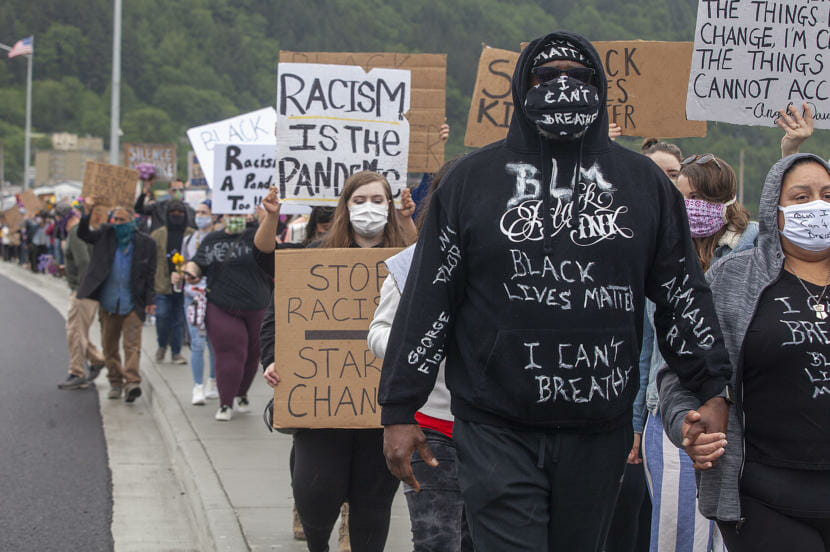
As protests over the death of George Floyd spread through communities across the state – some cities are questioning how and when their hometown police are using force.
From Utqiaġvik to Unalaska to Kodiak, Alaskans are protesting. It’s part of a massive social movement demanding police be held accountable, sparked in part by a video of the death of a black man named George Floyd who pleaded for air as a white Minneapolis police officer kneeled on his neck during an arrest.
His death and the deaths of many other black people in America has caused communities to consider radical changes to how police operate. In Minneapolis, the city council says it’s going to abolish its police department.
Anchorage’s Police Department released its written policy on Tuesday with a note that it has just been updated since Floyd’s death. Now, neck holds of any kind are prohibited unless they’re using deadly force.
But Juneau’s city police refused to release its written policy, at least, not without getting lawyers involved.
Activists in Juneau say police need to be more transparent with how they’re policing as there are clear racial equity problems in how laws are enforced in the state.
Over the past two weekends, several hundred Juneau residents have gathered in person, or online, to support Black Lives Matter and denounce police brutality and institutional racism. Protestors chanted “Juneau is not immune.” They spoke about their experiences at the hands of local police.
And, they demanded reforms to police oversight and what types of force officers can use.
They want changes to how local police — and staff at the Lemon Creek Correctional Facility — are trained on things like racial bias.
At Monday’s meeting of the Juneau Assembly ,Juneau Police Chief Ed Mercer said his officers stand with them.
“Since the killing of George Floyd for the past two Saturdays …members of our police department have attended rallies in Juneau to show our solidarity in denouncing excessive use of force by police departments,” he said.
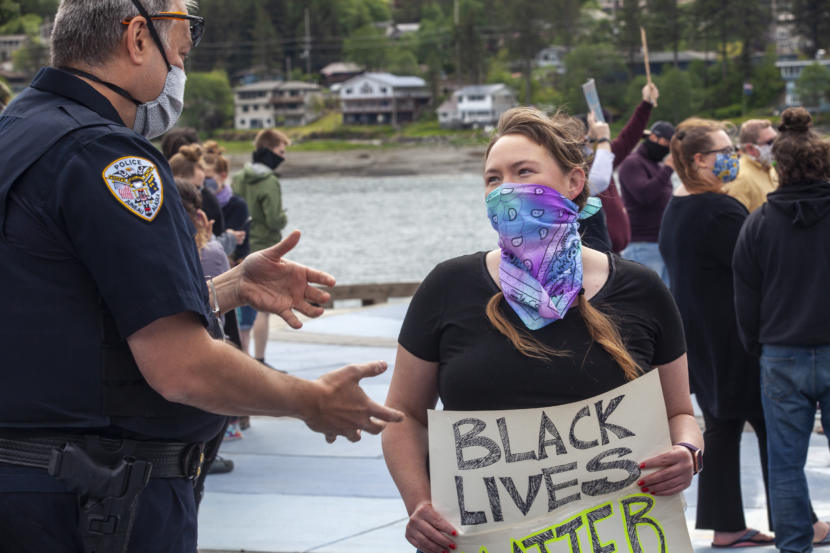
Mercer told the Juneau assembly on Monday that what happened in Minneapolis shouldn’t be tolerated. And he laid out some ways that the Juneau Police Department has worked to avoid it.
He said the hiring standards are stringent. Deputy Chief David Campbell said they don’t hire people who have domestic violence in their backgrounds or can’t pass background checks. Juneau police have worn body cameras since 2017.
And Mercer laid out some statistics from last year. Officers have to file reports with him whenever they use force that exceeds a “firm grip.” In 2019, he said they reported using force 54 times against 38 people. The gap between those numbers is because each officer involved in the situation has to file a report
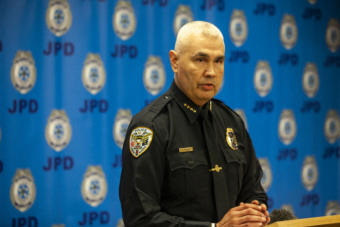
To put that into context, Mercer said generally officers are using force when they’re arresting people. Last year, they arrested 1,815 people. Mercer said that means Juneau police used force in just over 2% of their arrests.
Broadened even further, Mercer said they had 32,000 contacts with people last year. So those 38 people they used force on are fewer than 1% of the people they came in contact with.
“So, over 99% of the citizens we have contact have no use of force,” Mercer said. “Simply put, the people of Juneau do not have to fear police force unless they are committing a violent act or resisting arrest.”
But when assembly member Rob Edwardson tried to drill down into specifics about how and when Juneau Police decide to use force, he ran into a roadblock.
“May I see the printed use of force policy?” Edwardson said.
After a pause, Mercer responded “At this time — no.”
But, he said he was open to having a discussion about how to release that information to the assembly.
Edwardson said he wanted to see the policy because he’s hearing complaints about officers using force that’s disproportionate to the situations they’re responding too.
“These aren’t, you know like kneeling on somebody’s neck or anything like that,” Edwardson said. “But placing hands on people. Manhandling people. Perhaps doing more dangerous than necessary maneuvers in cars to stop people.”
Edwardson said he has studied use of force policies as part of his professional career.
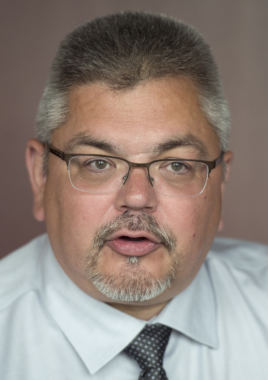
“I’m getting reports of people being stopped and asked questions with the police officers having their hand on the gun — which isn’t part of the interview position. Which is one of the reasons why I wanted to see the use of force policy,” he said.
Edwardson said he wanted to see complaints of use of force violations as well. But, like the use of force policy itself, Mercer said, they’d have to talk to their legal team before they released anything.
But beyond how city police are upholding laws and their own internal policies, some in the audience at that meeting questioned the basic philosophy behind how the city spends money on law enforcement.
Phillip Moser has been pushing the assembly to divert funds into things like rental assistance for people in Juneau who are struggling because the COVID-19 pandemic.
He linked it directly to how much money the city budgets for Juneau police.
“I’m saying that because, when it comes time to evict people from their homes, it’s going to be police — however nice they are — choosing to evict people and make them homeless, during a time when our need to have people in their homes is greatest and this is going to primarily affect people of color and minorities,” Moser said. “However nice police are in town — in Juneau. They are still going to be upholding the harassment of homeless people on the streets and they are going to be using funds to do that that have been proven — we’ve seen during our own efforts — would be better spent providing housing and support for those homeless people.”
Others said that if black community members are saying there’s a problem with how laws are enforced it’s the responsibility of the community to hear and address those problems.
“I think that there’s an attitude — and I’ve held it myself in the past — that our town is small enough and diverse enough and open-minded enough that racism and excessive use of force just isn’t a problem for us,” said Laura Steele. “But, having heard from the black community on Saturday and in conversations related to recent events, clearly that’s not the case. And it really pains me to say that far to often, black members of our community don’t feel safe, they don’t feel supported and they’re not made to feel welcome.”
Steele said she believes it’s the assembly’s responsibility to fix that.
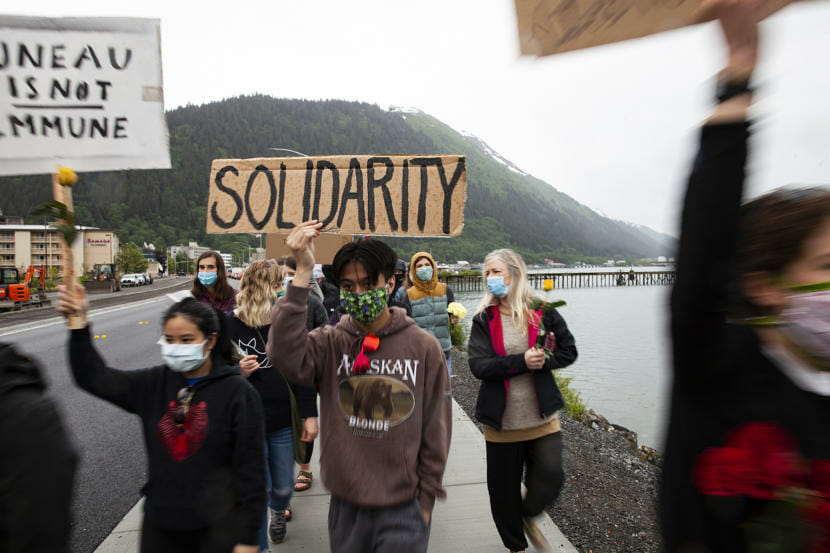
Sonia Ibarra told assembly members to look over the list of demands from the black community members who led Saturday’s rally and to lead uncomfortable conversations and challenge the white privilege that stands in the way of racial equity.
“I’m calling in because I’m hurting for our black, brown and Indigenous brothers and sisters. Because we need change across this country, across Alaska, across Juneau and this includes you. I ask you to hear the words of our community, of our people of color,” Ibarra said.
Assembly members plan to question Juneau police again in further detail later this month. They laid out some of the data that they want to see, such as a race-based breakdown of the situations in which police decided to use force and more information on the types of military surplus equipment the department has purchased.
The assembly is taking questions from community members at boroughassembly@juneau.org. The next meeting between the assembly and Juneau police is June 22.
